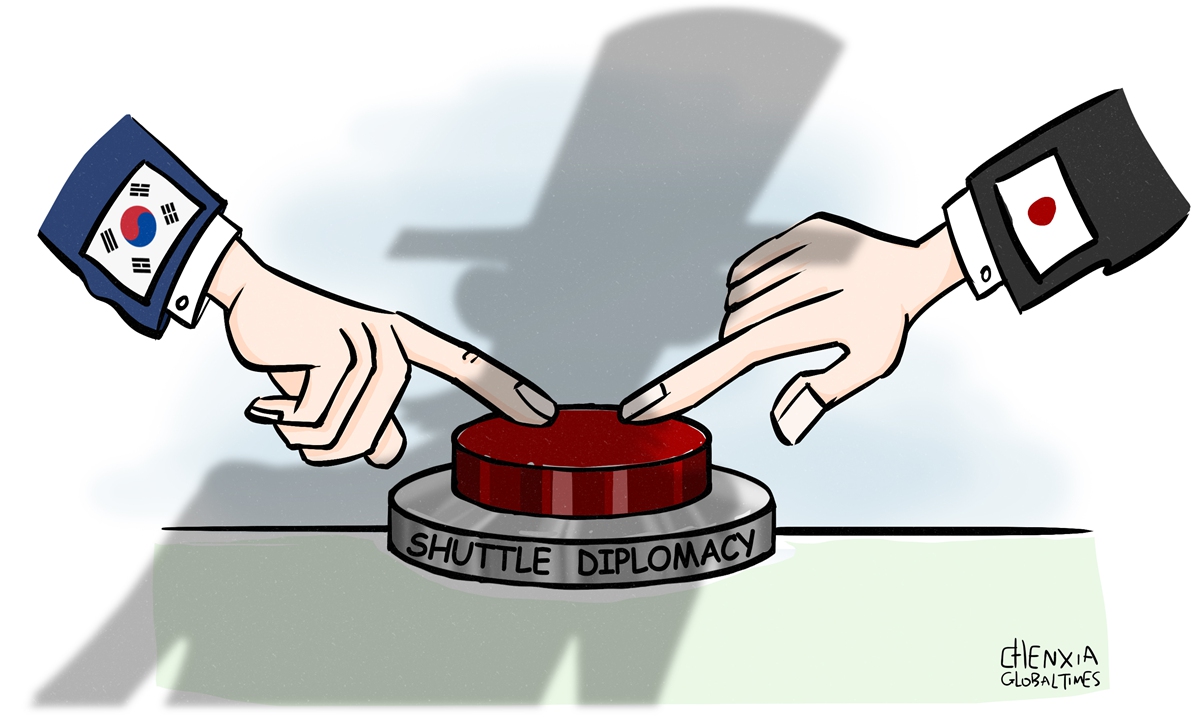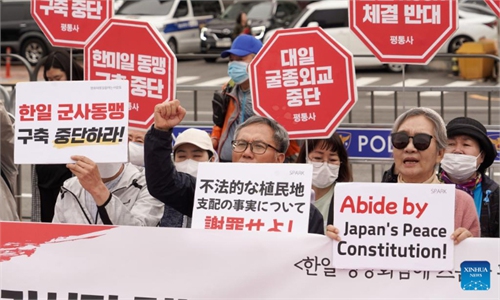
Illustration: Chen Xia/GT
Affected by historical and territorial issues, Japan-South Korea relations have been in constant discord and friction. However, since Yoon Suk-yeol took office, Seoul has been working hard to improve relations with Japan. Whether it be the Yoon administration's proposed a plan to compensate Koreans who became forced labor during Japan's colonial rule that does not require Japanese companies to contribute to the reparations to downplay historical issues between the two countries, or his declaration that he cannot accept the notion that Japan "must kneel because of our history 100 years ago." The sentiment is clear.Indeed, Yoon actively promoted the improvement of Japan-South Korea relations in order to fulfill his political commitment during the presidential election and has achieved certain results in this process. The high-level interactions between the two sides have been restarted and significantly increased. However, it must be pointed out that his approach has not only failed to win wide support from public opinion in South Korea, but has also failed to gain positive responses from Japan. This paints a true picture of the fragile improvement in relations between Japan and South Korea.
According to VOA, about 60 percent of South Koreans oppose the compensation plan. Many victims of forced labor and their families, as well as the Liberal Party in South Korea, accused Yoon of pursuing a policy of diplomatic surrender. For this reason, the improvement in relations between Japan and South Korea is fragile, and it seems unlikely that the relationship will be strong in the future.
In addition to the fragile improvement momentum, the improvement direction of Japan-South Korea relations is more noteworthy. Japan and South Korea are both important countries in Asia and major economies in East Asia. They are both close neighbors of China and allies of the US. Based on this, the improvement and development direction of Japan-South Korea relations will not only shape the future of bilateral relations, but also affect regional peace, stability and prosperity.
On the one hand, the improvement of Japan-South Korea relations may serve as an opportunity to restart China-Japan-South Korea cooperation. Japanese Prime Minister Fumio Kishida will confirm with Yoon the importance of an early resumption of the trilateral dialogue during the Japan-South Korea summit, according to Kyodo News. This means that the trilateral summit meeting is expected to resume within this year.
In fact, the last trilateral summit was held in 2019 and has not been held since then due to the COVID-19 pandemic, tensions between Japan and South Korea, and other factors. At a time when the prospect of world economic recovery after COVID-19 is uncertain and unilateral protectionism is surging, it is obvious that deepening trilateral cooperation is of special significance. South Korean Finance Minister Choo Kyung-ho said that trilateral cooperation can serve as an engine for a "speedy and sustainable" recovery, noting the three countries make up 20 percent of the global economy. Therefore, by improving trilateral relations and deepening mutually beneficial cooperation, China, Japan and South Korea will continue to be the most powerful engine for prosperity and development in East Asia and even Asia.
On the other hand, the moves in the security and defense fields between Japan and South Korea are worrisome. In the context of the intensifying strategic game between China and the US, Washington intends to rally its allies, Japan and South Korea, to build a so-called Asia-Pacific version of NATO. Previously, due to the discord between Japan and South Korea, there was no obvious progress in the strategic deployment of the US. However, with the improvement of the relations, the goal of the US was advanced. In other words, trilateral security cooperation led by the US has gradually changed from focusing on "the threat of North Korea" to a "military alliance" with obvious ideological overtones.
At the same time, some words and actions of Japan and South Korea in recent days are also disturbing. While vigorously developing its military and raising its defense expenditure, Japan is playing up the "China threat" and "Russia threat" narrative, claiming that "Ukraine today could be East Asia tomorrow." South Korea, which is committed to becoming a "global hub," seems to be taking sides, from suggesting to provide weapons to Ukraine to making irresponsible remarks on Taiwan question. Therefore, while actively cooperating with the strategic deployment of the US, Japan and South Korea have simultaneously shown hostile policy tendencies and perceptions toward their neighbors. This has caused concern about the future trend of Japan-South Korea relations and whether Japan and South Korea will become a new destabilizing factor for regional stability.
Looking ahead, the improvement of Japan-South Korea relations may contribute to regional prosperity and development, but also may disrupt regional peace and stability. The key lies in what direction the two countries will choose, whether they will stay committed to friendship with their neighbors and become a pivotal force for regional peace and stability or blindly engage in a closed and exclusive group with certain countries and provoke regional tension and confrontation. From this point of view, we hope that Kishida and Yoon can make the prudent judgment and serious consideration and avoid making wrong decisions that run counter to the general trend of regional peace and development and the historical trend.
The author is a visiting researcher at the Institute of Japan Studies, Liaoning University. opinion@globaltimes.com.cn

